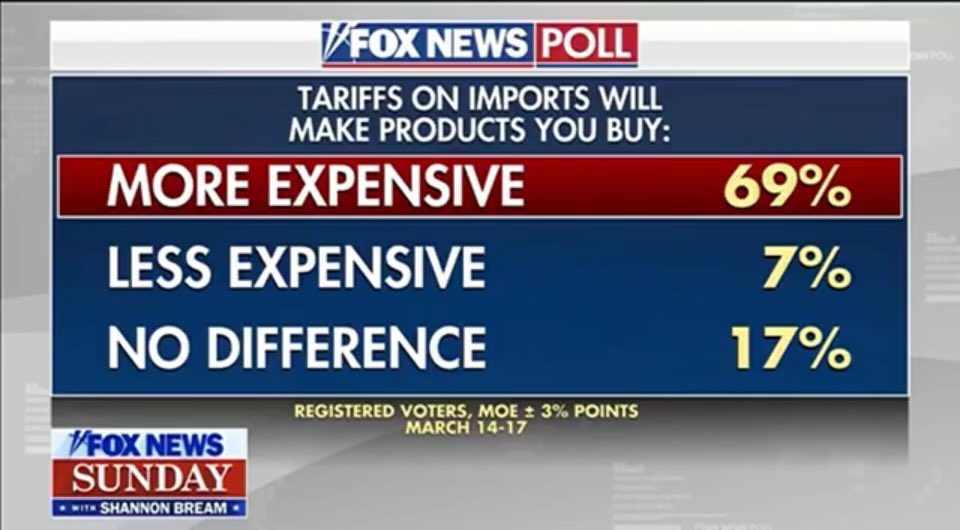
Today is supposed to be the day. It’s been pumped. It’s been dumped. It “liberation day,” the day Americans will be liberated from their savings, their income, their food, cars and flat screen TVs. But such cheap goods aren’t part of the American Dream, according to billionaire Treasury Secretary Scott Bessent.
There will be pain, as renowned economics scholar Tommy Tuberville explains, but Americans will be happy to endure it for the sake of their president’s desires.
Before the election, Trump claimed that tariffs would be paid by foreign nations, or at least their manufacturers, to the United States, bringing us a windfall. Other rationales included stopping illegal immigration, Fentanyl* trafficking and bringing manufacturing back to the United States with well-paid jobs that would restore the working man to the middle class.
How would this happen? If goods manufactured outside the United States were to be subject to a tariff upon entering, the demand for the once-lower-now-higher-priced items would die, leaving an opportunity to manufacture here. Whether it was American owned startups or foreign owned factories on American soil, didn’t matter, since either would need American workers and would have a huge American market open to them now that cheap foreign goods were no longer cheap. Where manufacturers once fled the high costs of the United States for cheaper labor markets elsewhere, they would now return to avoid the penalty of tariffs.
Is that how it will work? Not on this planet. Initially, there is the physics problem. Factories don’t spring up like magic from the beautiful American soil. They must be built. They require materials. They take time. They take investment of high interest rate money to construct. Businesses are reluctant to invest without stability so that they know the rules of the game won’t change tomorrow, making their investment worthless (or worth less, as the case may be). And even if they decide to put in the money and effort, it takes years before the factories are producing goods. During the interim years, everything will either cost more or we will have to do without. For years.
The second problem is that roads run both ways. To the extent the United States produces anything that anyone anywhere else wants to buy, our producers enjoy access to their markets as well as our own. We may enjoy Mexican avocados, but they enjoy our corn. We might be willing to live without avocado toast, but will our famers be good with having silos of corn rot for lack of export buyers? For years.
The third problem is that not all of us want to reimagine America as a third world country, and not just with regard to whisking randos off the streets, onto planes, and disappearing them in Salvadorean prisons. Are Americans willing to work for what apparel manufacturers pay for labor in southeast Asia? Hell, we won’t pick produce in the field, and we surely won’t make shirts for a dollar a day. Not only do we want a living wage, benefits, health care and paid maternity and paternity leave, but nobody is willing to die in another Triangle Shirtwaist Factory fire.
That means many a clothing item made in America will cost what Lululemon’s do now, and Lulu’s will be double that since they’re currently made in Vietnam. But you’ll be working that cool new manufacturing job getting more than what you’re getting now? Cool, cool, except the price for everything you’re buying, or want to buy, now will be double as well.
Which brings us to the fourth problem, that high priced foreign goods does not mean American made goods will be any less expensive. If that Toyota Taco is increased by 25%, do you think that not-quite-all-American Ford F-150 isn’t going up as well? If you can’t buy a foreign pickup for less, there is no reason under the sun for American pickups to be sold for any less than their foreign tomodachi. And that’s assuming it would even be possible, given that we’re still paying UAW rates and pension costs, which already broke Detroit once.
The suffering that the president says you are happy to endure is theoretically to reach the pot of gold at the end of the rainbow, an American manufacturing economy that can compete on a level playing field with the rest of the world. There will surely be suffering, but it is highly unlikely that there is a pot of gold at the end of the suffering. Indeed, there is no assurance when or if the suffering will end. Happy Liberation Day!
*Apparently, Trump plans to impose tariffs on Fentanyl, which will make it too expensive to import into the US. You can’t make this up.







